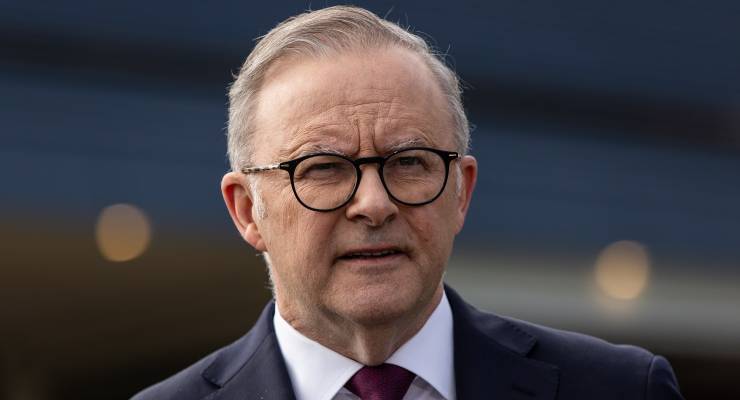
As the Albanese government enters its third calendar year in office, expect a cost-of-living relief push, a potentially divisive debate over religious discrimination, and many more discussions about housing.
But there is little chance of another referendum — the government appears to have put plans for a republic vote on ice for now — nor are we likely to see an election in 2024. Following last year’s bruising defeat in the Voice to Parliament vote, the government isn’t keen for more ballots.
When Prime Minister Anthony Albanese faced reporters last week, he said cost-of-living relief — balanced with the need to keep inflation from accelerating — would be the government’s priority. Easing the cost of living is a label that can be slapped on many disparate projects — for example, Albanese touted a new initiative to offer 300,000 fee-free TAFE places as a way to ease household costs.
“A great example of us providing cost-of-living relief through fee-free TAFE, whilst also addressing the longer term issues of labour market shortages and supply chain issues that Australia has to deal with in order to continue to put that downward pressure on inflation,” he said.
Among the 2024 government priorities mentioned by officials briefing reporters were universal childcare, improving the chances of first-time home buyers trying to enter the housing market, and strengthening Medicare. The latter will be achieved by working with states and territories to attract more GPs and nurses, according to the government’s plans.
There have been promises to invest more in renewable energy and to secure so-called critical minerals. Albanese said in October that “harnessing” the minerals would allow Australia to become a “renewable energy superpower”.
There will also be more trips abroad. The Australian Financial Review reported earlier this week that Albanese’s foreign travel schedule could average one journey abroad per month during the year’s second half.
When Parliament returns in February, religious discrimination laws are expected to come into focus once again. Attorney-General Mark Dreyfus is planning to release the findings of a review by the Australian Law Reform Commission, intended to help shape a new discrimination framework that would also increase protections for LGBTQIA+ students and staff at religious schools, The Sydney Morning Herald reported last weekend. A pair of moderate Liberal MPs urged their colleagues not to let the debate “again descend into a culture war that captures LGBTQ Australians in its crosshairs”.
If the opposition leader gets to decide — and he has been successful in shaping the agenda since the Voice referendum — migration will also be a big issue in 2024.
“It’s a huge issue … it turns out that this government is a soft touch on criminals, and we’ve seen that in the last 12 months, but we also have seen in relation to some of these asylum seekers as well,” Peter Dutton told 2GB radio last week.
While the referendum on the Voice failed, the disadvantage gap facing First Nations people remains a big problem for Australia.
Yet so far, there are no signs Indigenous issues will be high on this year’s priority list. For a subject he spent much of last year campaigning on — and on which he spent a considerable amount of political capital — Albanese has been largely silent on the disadvantages facing First Nations people since the referendum failed.
Background briefings from officials to reporters about government priorities this year have not mentioned Closing The Gap, nor has Albanese in any media appearances.
When asked a two-pronged question on Tuesday by a journalist in Queensland about Labor’s chances of winning an election there and about the political wisdom of continuing to push for treaty, Albanese chose to only answer the first question and then ended the press conference.
At another press conference three days into the new year, Albanese said there would not be an election until May 2025.
Nor is it likely we’ll see a referendum on making Australia a republic anytime soon, a stated goal of this government.
Treasurer Jim Chalmers said that the issue “hadn’t been a focus of his” when he fronted reporters earlier this week.
“Clearly, we are still going through the consequences of the referendum towards the end of last year, when the government is ready to make announcements about some of the other proposals for constitutional change, we will make them. But that’s not my focus right now,” he said.








Anton, you omitted to mention one major (if not the major) foreign policy issue that Albanese and his ALP cohorts will be taking great pains to ‘dodge’ in 2024, is the slavish support that Australia gives to those responsible for the genosidee that is occurring in Ocuppied Palestiiine. (Apologies for the deliberate spelling mistakes but one has to be at least mildly creative in getting around the censorship here.)
LOL The pedant in me never even thought of that!
Please, not another referendum. But if there had to be one I propose the subject be whether Australia ‘invests’ $380B in submarines which won’t be delivered for decades & which will likely be ancient technology before the first one leaves the slip.
Now there is one I’d vote NO to.
No mention of Stage 3 tax cuts? I think this will be a hot topic. I personally would not vote for the ALP for pursuing this.
What gets my goat is the selective nature of broken promises. Albo did not explain to the Australian voters the immense cost of AUKUS in the lead up to the last election. He would have known this would be 100s of billions of dollars. Pandering to the ADF, pandering to the LNP and Murdoch. Is Albo a leader or another useless politician?
Morrison was his predecessor and Dutton is the opposition leader.
How good does he have to be?
A lot is going to hinge around the Dunkley byelection to be held in a couple of months time. The Liberals have done nothing to woo back disaffected former supporters who’ve defected to the Teals, and are staking the future on winning middle and outer metro seats. Dunkley, 50 minutes south of Melbourne is a prime test case for this Liberal strategy. Within it is the traditionally Liberal leaning Mount Eliza, part battler/part aspirational Frankston, and mortgage belt suburbs of Carrum Downs and Skye. Byelections are an opportunity for electorates to give governments a kick in the pants without changing the government. With big cost of living pressures, a housing crisis, runaway immigration numbers, and a humiliating referendum shellacking damaging Labor, if the Liberals don’t win or make a very substantial dent in Labor’s 6.3% margin, it will be disasterous for the Liberals. With under 18 months until the next election, the Liberals would then be looking for a new strategy and seriously considering a new leader … with a talent pool barely deep enough to float a toothpick.
If it goes badly for Labor, do they have to drop the “softly, softly, we’re the responsible circumspect adults in the room” approach, and get more radical. And if the result is really bad, perhaps Labor has to consider a new leader? It’ll be fascinating stuff.
Interesting. What’s the Green’s profile in Dunkley?
If you scroll down the site below, you’ll see the Greens got a respectable 10.3 percent in 2022. Being so far from the city centre, it isn’t a natural seat for the Greens to do well in, but it’ll be interesting to see if the rental crisis lifts their vote.
https://www.abc.net.au/news/elections/dunkley-by-election-2024
Yeah, the demographics don’t look good for any Greenslides:
https://abs.gov.au/census/find-census-data/quickstats/2021/CED212
Median age 40
70% family households
70% homeowners
Is there a vaguely attractive Teal candidate ? Votes going there will probably be a better indicator than votes to the Liberals.
I don’t know if a Teal is standing. There wasn’t a Teal candidate in 2022. Interestingly, the Labor candidate, Jodie Belyea, is a newcomer to the Labor party and fits the Teal profile in some ways. She has had a career outside of politics and is popular in the local community. (In one of the photos she is even wearing a Teal-ish coloured T-shirt which relates to her community work.)
The fact that Albo was in Frankston in person this moring to announce Belyea’s candidacy is an indication of the high stakes being played for in Dunkley.
https://www.theage.com.au/politics/federal/community-leader-jodie-belyea-the-labor-frontrunner-for-dunkley-byelection-20240109-p5ew1a.html
https://www.theage.com.au/politics/federal/prime-minister-anthony-albanese-expected-to-speak-from-frankston-20240111-p5ewg9.html
Yeah… wouldn’t matter.
Pragmatic moderate Liberal (ie: “swinging”) voters are already prepared to vote Labor. Indeed, they’re the whole reason Labor is where it is today.
Teals are for otherwise rusted-on Liberals who would never vote Labor on principle, but really don’t like the wackadoo right-wing identity politics and/or think climate change is actually real.
Sorry drsmithy, my reply to you that there doesn’t appear to be a Teal candidate in Dunkley is still “waiting approval”.
You might have heard the news about the south Gold Coast seat or McPherson being vacated by the retiring Liberal Karen Andrews, former Home Affairs minister. The Poll Bludger (quoting the Australian) reported that Liberal party “insiders are said to be “increasingly concerned” about the emergence of a “McPherson Matters” group that is preparing a teal independent bid for the seat”.
I find it hard to believe the Teals could win a Gold Coast seat, but if they pulled it off, political oblivion would be that much closer for the LNP.
https://www.pollbludger.net/ (Scroll down to the heading New Year Miscellany etc, fifth paragraph in.)
A new leader? Albo hardly demonstrates leadership qualities. Perhaps “Labour was to consider having a leader”?
It will all boil down to how the Libs handle the migration issue. Will they dog whistle, or will they actually prosecute a case that shows the endight be nigh for the bi-partisan support of Big Australia.
‘…more discussions about housing.’ Ah, yes. It’s always best to ‘discuss’ a glaring issue of inequality than to actually do something constructive about it.
Will they even “discuss” fuel efficiency standards that we should already have in place? Given their extensive implementation throughout the rest of the world, this faffing about and resultant rendering us a dumping ground for the worst vehicles is inexcusable.